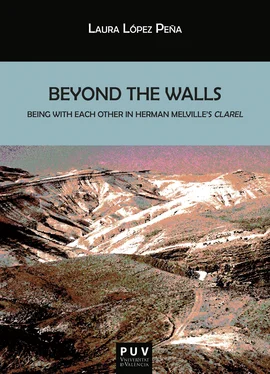Laura López Peña - Beyond the Walls.
Здесь есть возможность читать онлайн «Laura López Peña - Beyond the Walls.» — ознакомительный отрывок электронной книги совершенно бесплатно, а после прочтения отрывка купить полную версию. В некоторых случаях можно слушать аудио, скачать через торрент в формате fb2 и присутствует краткое содержание. Жанр: unrecognised, на английском языке. Описание произведения, (предисловие) а так же отзывы посетителей доступны на портале библиотеки ЛибКат.
- Название:Beyond the Walls.
- Автор:
- Жанр:
- Год:неизвестен
- ISBN:нет данных
- Рейтинг книги:3 / 5. Голосов: 1
-
Избранное:Добавить в избранное
- Отзывы:
-
Ваша оценка:
- 60
- 1
- 2
- 3
- 4
- 5
Beyond the Walls.: краткое содержание, описание и аннотация
Предлагаем к чтению аннотацию, описание, краткое содержание или предисловие (зависит от того, что написал сам автор книги «Beyond the Walls.»). Если вы не нашли необходимую информацию о книге — напишите в комментариях, мы постараемся отыскать её.
Beyond the Walls. — читать онлайн ознакомительный отрывок
Ниже представлен текст книги, разбитый по страницам. Система сохранения места последней прочитанной страницы, позволяет с удобством читать онлайн бесплатно книгу «Beyond the Walls.», без необходимости каждый раз заново искать на чём Вы остановились. Поставьте закладку, и сможете в любой момент перейти на страницу, на которой закончили чтение.
Интервал:
Закладка:
BEYOND THE WALLS
BEING WITH EACH OTHER
IN HERMAN MELVILLE’S CLAREL
Biblioteca Javier Coy d’estudis nord-americans
http://www.uv.es/bibjcoy
Directora
Carme Manuel
BEYOND THE WALLS
BEING WITH EACH OTHER
IN HERMAN MELVILLE’S CLAREL
Laura López Peña
Biblioteca Javier Coy d’estudis nord-americans
Universitat de València
Beyond the Walls: Being with Each Other in Herman Melville’s Clarel
© Laura López Peña
1ª edición de 2015
Reservados todos los derechos
Prohibida su reproducción total o parcial
ISBN: 978-84-9134-168-0
Imagen de la cubierta: Laura López Peña
Diseño de la cubierta: Celso Hernández de la Figuera
Publicacions de la Universitat de València
http://puv.uv.es
publicacions@uv.es
A Rodrigo
A mi familia
Acknowledgements
To Cristina Alsina, Constante González Groba, Michael Jonik, and Bill Phillips, for their dedication to reading this work in earlier stages and providing important questions and comments.
To Marta Segarra, for making possible an academic context where I could develop my own investigation on Herman Melville’s Clarel within the research project “Literatura y comunidades: una visión desde el género” (Plan Nacional de I+D+i [2008-2011], Ministerio de Economía y Competitividad, ref. FEM 2011-23808 [2012-2014]). My analysis of community is also indebted to a previous research project led by Marta Segarra: “Representaciones de la comunidad en las escritoras y cineastas de la posmodernidad” (Plan Nacional de Investigación Científica, Desarrollo e Innovación Tecnológica, D.G.I., Ministerio de Educación y Ciencia, ref. FFI 2008-03621/FILO [2009-2011]). My gratefulness also goes to Helena González Fernández, for incorporating me as postdoctoral researcher at the Centre Dona i Literatura, Universitat de Barcelona.
To the Melville Society, for many years of encouragement of my work on Clarel , and for allowing me to do research in their Archive in New Bedford, MA, as their Melville Society Archive Fellow in January 2011. To John Bryant, for hosting me during my research visit to New York in February 2011, and to Wyn Kelley, for her generosity during my research trip to Cambridge, MA, in January-February 2011.
To Carme Manuel, for enthusiastically embracing this project. For her endless energy, encouragement, feedback, and flexibility in the process of writing this volume. For making working with her such an easy and pleasant experience, and for a life of important contributions to both American Studies and Melville Studies in Spain, thanks to which volumes such as this one have been possible.
To Tim Marr, for his always enormous generosity and support, on a both personal and academic level, since 2009, and, most specially, during my two research stays in Chapel Hill, NC, in the spring of 2012 and 2013, respectively. For his sharp questions and insightful comments, and for dedicating time he did not have to reading my work at different stages.
A mis amigos y amigas, por su paciencia y comprensión a lo largo de los años.
A mi familia, sin el apoyo y el amor de la cual nada en la vida sería posible.
A Rodrigo Andrés, por muchísimo más de lo que nunca podré expresarle. Por dar origen a mi amor por Melville y por darme libertad para encontrar a mi propio Melville. Por su dedicación a este trabajo en todas y cada una de sus etapas y por estar presente en cada página de él. Por su profesionalidad, amistad y por formar parte de mi vida. Con mucho amor, infinito agradecimiento, y redoblada admiración. De corazón.
Contents
PROLOGUE by Timothy Marr
INTRODUCTION
CHAPTER 1 Intersubjective Universalism: A Theoretical Articulation
CHAPTER 2 Intersubjectivity and Universalism in Herman Melville’s Oeuvre
CHAPTER 3 Writing Clarel
CHAPTER 4 The Politics of Clarel : “Without the Walls”
CHAPTER 5 Clarel : Poem and Pilgrimage
CHAPTER 6 Resonant Contexts: The Holy Land and the United States
CHAPTER 7 “Separate thyself from me”: Inter-community Walls
CHAPTER 8 Aborted Potentialities: Inter-personal Walls
CHAPTER 9 Impossible Intersubjectivity: Impracticable Universalism
CONCLUSIONS
BIBLIOGRAPHY
Prologue
Timothy Marr University of North Carolina, Chapel Hill
Perhaps the most widely read of Herman Melville’s literary works today is “Bartleby, the Scrivener”, a sketch of an abortive attempt of a New York lawyer to make sense of an employee who “prefers not to” follow his requests. The story, subtitled “A Story of Wall Street”, is full of walls: the screens that sector the law office, the bricks that serve as the only view from its window, and the prison named the Tombs that immures the solitary copyist in which he dies in vagrancy. The narrator ends his story with the exclamation “Ah Bartleby, Ah humanity!”—in part a confession of his realization that the inside truths of all humans are heartbreakingly pent up in impenetrable isolation. However, this story of Wall Street paradoxically provides avenues of connection as well as impediments of occlusion. The same language that fails to account for the strange lot of the scrivener also expresses a universal yearning for intersubjective understanding. Melville suggests in “Bartleby” that the “dead letters” of words both embody the walls that tragically divide individuals even as they ironically intimate the potential for correspondence between writer and reader on gracious literary errands of life.
Some of the reasons for Melville’s centrality in the canon of great American authors are the diversity of his writings, the planetary reach of the settings of his literature, and his democratic inclusion of characters from all around the ambit of the world. This is part of the foundation upon which López builds her important interpretation of Melville’s art as a universalist project of literary production. Laura López Peña’s book explores the dynamic paradoxes of intersubjective universalism by assessing a broad range of recent critical theories of human community as well as exploring the sectarian problem of communitarian or sectarian exclusion. She then examines their operations in Melville’s first and most important published works of poetry, Clarel and Battle-Pieces .
López suggests that the longings of interhuman love are natural traces of the togetherness experienced between members of a diverse family to which all belong. This yearning, which she shares with Melville, embodies the political promise of democracy—a “common continent of men [sic] […] federated along one keel” that joins varied individuals in a multilogue that dissolves the distance of difference through intimate interaction. In such a pluralist world the intersubjectivity that she calls “human beings who are- with each other” (after Jean-Luc Nancy) bridges division by restoring a community of forbearance that is radical in its inclusive universalism. 1
“Bartleby, the Scrivener” dramatizes how this promise remains fleeting and utopian as it is confounded by the limited profession of the lawyer’s conventional charity to reach across and comprehend Bartleby’s traumatic aloneness. Melville often chafed against the cruelty of a fate that created humanity of the same kin yet ruptured the intimacy of community by a series of separations that set people against themselves. López argues that one force that sunders human society into “scattered subjectivities” is humanitarian cosmopolitanism itself through the partiality and privilege of its claims to “universalism” which simultaneously segregate others as outsiders, heathens, castaways, criminals, renegades, and exiles. Among the authorizing agencies that build walls between individuals are religious exclusiveness, racial supremacy, aristocratic elitism, national exceptionalism, and ethnic communitarianism. These provincializing ideologies render humans into what Melville calls “isolatos”, entities so removed from one another that they remain confined within the myopic boundaries into which their cultures have drawn them and by which their societies have defined them.
Читать дальшеИнтервал:
Закладка:
Похожие книги на «Beyond the Walls.»
Представляем Вашему вниманию похожие книги на «Beyond the Walls.» списком для выбора. Мы отобрали схожую по названию и смыслу литературу в надежде предоставить читателям больше вариантов отыскать новые, интересные, ещё непрочитанные произведения.
Обсуждение, отзывы о книге «Beyond the Walls.» и просто собственные мнения читателей. Оставьте ваши комментарии, напишите, что Вы думаете о произведении, его смысле или главных героях. Укажите что конкретно понравилось, а что нет, и почему Вы так считаете.










